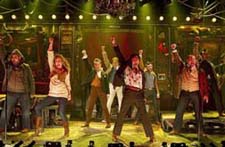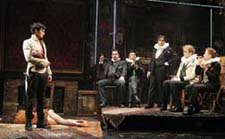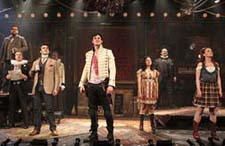Lucy Komisar"Bloody Bloody Andrew Jackson"
is a stunning rock account "Bloody Bloody Andrew Jackson." Alex Timbers' play is a stunning satirical revisionist history of America's seventh president Andrew Jackson as a genocidal Indian killer. It's done in a rock idiom that takes the edge off and makes him seem almost a man of his time as well as/rather than a political murderer. But with some present day vernacular, it takes on immediacy. It's a commentary on the past and also on the present day politics of state killing that is rare in its gut-wrenching toughness.
Chandeliers are suspended over the audience and stage. Walls are hung with oils of the grandees of the time. Here comes Jackson (Benjamin Walker) and his crew chanting "Populism, yeah yeah! Take a stand against the elite. They don't care anything for us!" They raise their fists. "Populism, yeah yeah." The cast is vibrant and full of energy. Timbers' text and Friedman's lyrics are truthful and outrageous. Jackson's family was killed by Indians. We see the arrows flying. Andrew and his wife Rachel (Maria Elena Ramirez) throw blood at each other. He declares, "I will make them all bleed." He says, "Rachel, I love you, but I've also got to kill the entire native population." What a history lesson! Walker might be as charismatic as Jackson was.
Jackson was elected president in 1828. We see Washington politicians John Quincy Adams, Martin Van Buren, John Calhoun, Henry Clay, and James Monroe in their white ruffled collars. They propose a corrupt deal. But Jackson is against the Washington insiders, the aristocracy. We give those Wall Streeters a chance, he says, and they'll destroy the nation.
So what was he proposing instead? His populist "direct democracy?" That turned out to be posturing to crowds. Calhoun and Van Buren were his vice presidents. But the play points out that he was also for shutting down the national bank, a private institution that had been made the depository of federal revenues from which some rich and powerful men earned generous profits. However, the theme is Jackson's overriding failure on human rights. He owned slaves. In the play, his wife quips, "I always thought I'd live in a house with a dog and some kids and a few slaves." He signed the Indian Removal Act in 1830, forcing tribes east of the Mississippi to move to the west so whites could steal their lands. We see his deal with Blackhawk, who betrayed the Indians. How come the Democratic Party is still holding Jackson Day dinners? How come it takes an inventive rock musical to bring the issue to the American public? With Friedman's eclectic rock music and Danny
Mefford's choreography (including a Nutcracker style ballet
and a rock dance with rifles) this production is a powerful
and pulsating in-your-face denunciation of an American genocide. | lobby | search
| home | cue-to-cue |
discounts | welcome | film
| dance | reviews
| |
||||||




